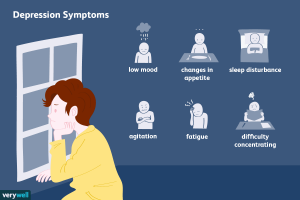More recently, there has been a surge of people worldwide struggling with depression not to mention the family, friends, and coworkers that are also impacted. According to the World Health Organization, depression is a common illness worldwide, with more than 300 million people affected.”
Depression a term that we all have heard so many times yet the majority of us don’t understand the actual reality of it or we don’t realize the impact it has on the person’s life. In Pakistan usually, a person suffering from depression does not even apprehend what is depression.
The reason being the lack of awareness and information about such sensitive and complex issues that do not only entangles a human’s heart but also his mind and halts the growth and prosperity of the person.
Cognizance against depression can create a better atmosphere for the person and their family to handle the issue at hand. The more a person knows about depression, the more empowered they will be to find a treatment that works for them. It can be helpful to learn about depression in general, including its causes and symptoms.
Knowing what prompts depressive episodes can help people avoid or manage triggers, which may reduce future depressive episodes. Educating friends and family members can also help, as loved ones can watch out for warning signs and be supportive when a person is having a difficult time. It is also important for people to get to know their symptoms and warning signs so that if they are feeling worse, they can identify this.
What are the signs of depression?
You may have noticed a change in the way you’re responding or feeling about things. The following points are indications that it could be depression:
• Persistent sadness, lasting two weeks or more.
• Loss of interest in your favorite things.
• Finding no fun or enjoyment in life.
• Loss of self-confidence.
• Feeling guilty, bad, unlikeable, or not good enough.
• Feeling empty inside.
• Feeling useless or unable to cope with life.
• Feeling bored all the time.
• Increased feelings of anxiety.
• Inability to see a future for yourself.
• Thinking everything is pointless.
• Thinking life is not worth living.
• Thoughts of death or suicide.
• Wanting to go to sleep and never wake up again.
• Especially low mood in the mornings.
• Feeling more irritable, frustrated, or aggressive than usual.
• Trouble concentrating on things, poor memory.
Other signs may include:
• Loss of energy, feeling tired all the time.
• Changed sleep pattern – difficulty getting to sleep, bad nightmares, waking in the night, waking up too early, or sleeping much more than usual.
• Spending less time socializing with friends or family.
• Loss of sexual desire.
• Changed eating pattern – loss of appetite, weight loss or comfort eating.
• Getting lower grades than usual at school, college, or university.
• Not going to school/college/work, or becoming disruptive.
• Becoming a hypochondriac, worrying lots about the illness.
• More headaches, backaches or stomach aches than you normally get.
• Turning to alcohol or drugs to try to make yourself feel better. (Source: https://www.outlife.org.uk/)
Measures to overcome depression
Think in bits and pieces instead of the whole picture
Depression can tinge recollections with negative emotions that might lead to bad thoughts and apprehension. You may find yourself focusing on the one thing that went wrong instead of the many things that went right.
Try to stop this overgeneralization and thinking too much about the whole thing. Push yourself to recognize the good. If it helps, write down what was happy about the event or day. Then write down what went wrong. Just thinking about one thing may lead to severe unhappiness try to think about the bits that made you happy and recollect those memories now and then.
Seeing the weight you’re giving to one thing may help you direct your thoughts away from the whole and to the individual pieces that were positive.
Set attainable goals
A lengthy to-do list may be so weighty that you’d rather do nothing. Instead of compiling a long list of tasks, consider setting one or two smaller goals. That would help you achieve something difficult to achieve or difficult for you to complete. Set out easily doable tasks
For example:
• Don’t clean the house; take the trash out.
• Don’t do all the laundry that’s piled up; just sort the piles by color.
• Don’t clear out your entire email inbox; just address any time-sensitive messages.
• Don’t take the long route to solve any issue; just sort them on priority bases
• Don’t think about making everyone happy; think what makes you happy
When you’ve done a small thing, set your eyes on another small thing, and then another. This way, you have a list of tangible achievements and not an untouched to-do list.
Reward your efforts
All goals are worthy of recognition, and all successes are worthy of celebration. When you achieve a goal, do your best to recognize it and you have the right to feel happy about it?
Celebrate every little and big thing that brings a smile on your face. You may not feel like celebrating with a cake and confetti, but recognizing your successes can be a very powerful weapon against depression’s negative weight.
The memory of a job well-done may be especially powerful against negative talk and overgeneralization. It would act as an energizer in a time when you are feeling low or down and would motivate you for greater achievements.
Do something you enjoy…
Depression can push you to give in to your fatigue. It may feel more powerful than happy emotions. As negativity makes you tired and the burden of it makes you feel lethargic.
Try to push it back and do something you love something relaxing, but energizing. It could be playing an instrument, painting, hiking, or biking. These activities can provide subtle lifts in your mood and energy, which may help you overcome your aforementioned symptoms.
You can pursue activities like
like listening to music….
Research and a Trusted Source indicates music can be a great way to boost your mood and improve symptoms of depression. It may also help you strengthen your reception of positive emotions. Music may be especially beneficial when performed in group settings, such as a musical ensemble or band. You can also reap some of the same rewards simply by listening.
Spend time in nature
Mother Nature can have a powerful influence on depression. Research suggests people who spend time in nature have improved mental health. Exposure to sunlight may offer some of the same benefits. It can increase your serotonin levels, which can provide a temporary mood boost. Consider taking a walk at lunch among the trees or with friends in your local park. These activities can help you reconnect with nature and soak in some rays at the same time.
Spend time with loved ones
Depression can tempt you to isolate yourself and withdraw from your friends and family, but face-to-face time can help wash away those tendencies. If you’re unable to spend time together in person, phone calls or video chats can also be helpful. Try to remind yourself these people care about you. Resist the temptation to feel like you’re a burden. You need the interaction and the connection with the people around you.
Try something new entirely
When you do the same thing day after day, you use the same parts of your brain. You can challenge your neurons and alter your brain chemistry by doing something entirely different. Research also shows doing new things can improve your overall well-being and strengthen your social relationships.
To reap these benefits, consider trying a new sport, taking a creative class, or learning a new cooking technique. These techniques would help you deviate from your negative thoughts and anxiety and would open avenues to enjoy new things in life.
Volunteering
Knock out a few birds with one stone, as we rightly put in Urdu (Ik teer sey Do Shikaar) spending time with other people and doing something new by volunteering and giving your time to someone or something else. You may be used to receiving help from friends and family, but reaching out and providing help may improve your mental health more as there is nothing more soothing then helping others as many times in life we have been helped too.
Added Bonus: People who volunteer experience physical benefits, too. This includes a reduced risk of hypertension.
You can also use this as a way to practice gratitude
When you do something you love, or even when you find a new activity you enjoy, you may be able to boost your mental health more by taking time to be thankful for it. Research shows gratitude can have lasting positive effects on your overall mental health and it also makes you feel content and satisfied in life.
What’s more, writing down your gratitude, including writing notes to others can be particularly meaningful, as we don’t know what shall happen the next moment in our lives so sharing what we think about others and being thankful for what we have can make a huge difference in your and your loved one’s life.
Incorporating meditation may help
Stress and anxiety can prolong your depression symptoms. Finding relaxation techniques can help you lower stress and invite more joy and balance into your day. Research suggests activities like meditation, yoga, deep breathing may help you improve your sense of well-being and feel more connected to what’s happening around you.
What you eat and drink can also affect how you feel
There’s no magic diet that will treat depression. But what you put into your body can have a real and significant impact on the way you feel.
Eating a diet rich in lean meats, vegetables, and grains may be a great place to start. Try to limit stimulants like caffeine, coffee, and soda.
Some people also feel that they have more energy when they avoid sugar, preservatives, and processed foods. If you have the means, consider meeting with a doctor or registered dietitian for guidance. You can also have chocolates as a mood booster as research has proven that having chocolates especially dark chocolate can make your mood better.
If you’re up for exercise, consider a walk
On days when you feel as if you can’t get out of bed and want to just lie down, exercise may seem like the last thing you’d want to do. However, exercise and physical activity can be powerful depression fighters. Research suggests that, for some people, exercise can be as effective as medication at relieving depression symptoms. It may also help prevent future depressing episodes. If you’re able to, take a walk around the block. Start with a five-minute walk and work your way up from there.
Getting enough sleep can also have a noticeable effect
Sleep disturbances are common with depression. You may not sleep well, or you may sleep too much. Both can make depression symptoms worse. Aim for eight hours of sleep per night. Try to get into a healthy sleeping routine. Going to bed and waking up at a set routine every day can help you with your daily schedule. Getting the proper amount of sleep may also help you feel more balanced and energized throughout your day.
Consider clinical treatment
You may also find it helpful to speak to a professional about what you’re going through a therapist or a psychologist can help you to deal with depression and anxiety with the right counseling and help you to find the path to relaxation.
They can assess your symptoms and help develop a clinical treatment plan tailored to your needs. This may include traditional options, such as medication and therapy, or alternative measures, such as acupuncture. Finding the right treatment for you may take some time, so be open with your provider about what is and isn’t working. Your doctor will work with you to find the best option.
Keep this option as your last resort to overcome anxiety and depression.
Keep a journal
Keeping a journal is a powerful strategy for fighting depression. Writing down thoughts, feelings, and problems can allow individuals to identify patterns, triggers, and warning signs relating to their depression. It helps you to channelize your thoughts and emotions. It can also give people perspective on particular issues and help them generate solutions. Writing things down can be especially helpful before bed, especially if distressing thoughts are hindering sleep. If people do not feel comfortable keeping a journal due to privacy concerns, they can destroy the paper afterward. Some people find the act of writing itself therapeutic.
Another journaling option is to make a list of things for which a person is grateful. Researchers noted positive effects on the brain in people who kept such a list. People sometimes refer to this as keeping a gratitude journal.
Practice mindfulness
Mindfulness involves focusing on the present moment. It stops people from concentrating on the past or worrying about the future. Anyone can practice mindfulness at any time, but some people may find it helpful to begin by using an app or attending a class. Recent research from 2019 links mindfulness practices with lower levels of depression and anxiety.
Pairing mindfulness with cognitive therapy may prevent the recurrence of depressive episodes as effectively as maintenance antidepressant medications.
Visualize a happy memory
The subconscious responds very powerfully to feeling, and the more of a sensory experience you can make your reflective memory, the more effective it will be. Utilize all your senses, can you see, hear, smell, touch, and taste that happy memory. We should make every attempt to live in the present moment, but are times where we have to search in the past for the good stuff.”
Conclusion
Depression is a treatable mood disorder. People can recover from depressive episodes with lifestyle changes, coping strategies, talk therapy, or medications. For most people, a combination of these methods is necessary.
How much of your life do you spend in the present moment? How much time do you spend daydreaming, ruminating about the past, or worrying about the future? “If you are one of the 75% of the adults in Pakistan struggling with depression or anxiety, begin to take control over your life today,”













